302 scholarly books by University College London and 17
have author last names that start with G
302 scholarly books by University College London and 17
302 scholarly books by University College London
17 have author last names that start with G have author last names that start with G
17 have author last names that start with G have author last names that start with G
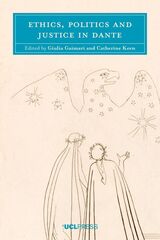
Ethics, Politics and Justice in Dante
Giulia Gaimari
University College London, 2019
While Dante Alighieri’s writings engaged with the culture of medieval Florence and Italy, his moral and political thought still speaks compellingly to modern readers today.
Bringing together an international and interdisciplinary group of contributors, ranging across history, philology, classical studies, philosophy, and theology, Ethics, Politics and Justice in Dante presents new research on ethics, politics, and justice in the works of Dante Alighieri, including chapters on Dante’s conception of the afterlife. Contributors scrutinize the Divine Comedy and Dante’s other works in Italian and Latin, showing the evolution of his thought throughout his writing career, with chapters focusing especially on his early philosophical Convivio and on the two “Eclogues” of his final years. Other chapters tackle themes relating to judgment, justice, rhetoric, and literary ethics in the Divine Comedy, as well as the differing public reception and use of Dante’s work in Italy and Britain.
Bringing together an international and interdisciplinary group of contributors, ranging across history, philology, classical studies, philosophy, and theology, Ethics, Politics and Justice in Dante presents new research on ethics, politics, and justice in the works of Dante Alighieri, including chapters on Dante’s conception of the afterlife. Contributors scrutinize the Divine Comedy and Dante’s other works in Italian and Latin, showing the evolution of his thought throughout his writing career, with chapters focusing especially on his early philosophical Convivio and on the two “Eclogues” of his final years. Other chapters tackle themes relating to judgment, justice, rhetoric, and literary ethics in the Divine Comedy, as well as the differing public reception and use of Dante’s work in Italy and Britain.
[more]
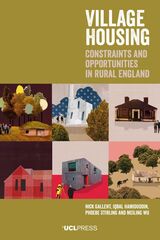
Village Housing
Constraints and Opportunities in Rural England
Nick Gallent
University College London, 2022
An examination of housing access and affordability barriers in rural England.
Village Housing explores the housing challenges faced by England’s amenity villages, rooted in post-war counter-urbanization and a rising tide of investment demand for rural homes. It tracks solutions to date and considers what further actions might be taken to increase the equity of housing outcomes and thereby support rural economies and alternate rural futures. The authors examine first the interwar reliance on landowners to provide tied housing and post-war diversification of responses to rising housing access difficulties, including from the public and third sectors; second, recent community-led responses; and third, actions that disrupt established production processes: self-build, low impact development, and a re-emergence of council provision. These responses to the village housing challenges are set against a broader backdrop of structural constraints and opportunities to reduce those constraints through planning, land, and tax reforms that can broaden the social inclusivity and diversity of villages and support their economic well-being.
Village Housing explores the housing challenges faced by England’s amenity villages, rooted in post-war counter-urbanization and a rising tide of investment demand for rural homes. It tracks solutions to date and considers what further actions might be taken to increase the equity of housing outcomes and thereby support rural economies and alternate rural futures. The authors examine first the interwar reliance on landowners to provide tied housing and post-war diversification of responses to rising housing access difficulties, including from the public and third sectors; second, recent community-led responses; and third, actions that disrupt established production processes: self-build, low impact development, and a re-emergence of council provision. These responses to the village housing challenges are set against a broader backdrop of structural constraints and opportunities to reduce those constraints through planning, land, and tax reforms that can broaden the social inclusivity and diversity of villages and support their economic well-being.
[more]

Fake Gods and False History
Being Indian in a Contested Mumbai Neighbourhood
Jonathan Galton
University College London, 2023
A narrative of a central Mumbai neighborhood’s divided community.
In an age where history is a global battleground and fake news proliferates, culture wars are being waged across India over its future—majoritarian or inclusive, neoliberal or socialist, religious or secular?
Fake Gods and False History takes us to the BDD Chawls, a central Mumbai neighborhood of tenement blocks (chawls) on the brink of a controversial redevelopment. It reveals how contested narratives of Indian history play out in the daily life of this divided neighborhood and how the legacies of certain godlike but very human historical figures, such as Dr. Babasaheb Ambedkar and Chhatrapati Shivaji, are invoked by different communities. Jonathan Galton draws on research conducted among the formerly untouchable Dalit Buddhist community, who are staunchly opposed to the redevelopment plans and deeply critical of the religious nationalism they perceive in their Hindu neighbors. We also meet young male migrants living in village-linked dormitory rooms called Gramastha Mandals, trapped in a liminal space between urban and rural.
Throughout the book, which is woven through with candid reflections on methodology and research ethics, readers are challenged to draw connections with their own experiences of history impinging on their lives. A story that might initially seem parochial will thus resonate with a diverse global audience.
In an age where history is a global battleground and fake news proliferates, culture wars are being waged across India over its future—majoritarian or inclusive, neoliberal or socialist, religious or secular?
Fake Gods and False History takes us to the BDD Chawls, a central Mumbai neighborhood of tenement blocks (chawls) on the brink of a controversial redevelopment. It reveals how contested narratives of Indian history play out in the daily life of this divided neighborhood and how the legacies of certain godlike but very human historical figures, such as Dr. Babasaheb Ambedkar and Chhatrapati Shivaji, are invoked by different communities. Jonathan Galton draws on research conducted among the formerly untouchable Dalit Buddhist community, who are staunchly opposed to the redevelopment plans and deeply critical of the religious nationalism they perceive in their Hindu neighbors. We also meet young male migrants living in village-linked dormitory rooms called Gramastha Mandals, trapped in a liminal space between urban and rural.
Throughout the book, which is woven through with candid reflections on methodology and research ethics, readers are challenged to draw connections with their own experiences of history impinging on their lives. A story that might initially seem parochial will thus resonate with a diverse global audience.
[more]
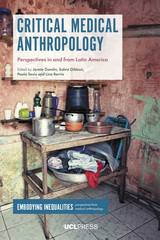
Critical Medical Anthropology
Perspectives in and from Latin America
Jennie Gamlin
University College London, 2020
Critical Medical Anthropology presents inspiring new work from scholars engaged with and carrying out ethnographic research in or from Latin America, addressing themes of central importance to contemporary perspectives on Critical Medical Anthropology (CMA). This includes issues of health inequalities, embodiment of history, indigenous health, non-communicable diseases, social justice, gendered violence, migration, substance abuse, reproductive politics and the judicialisation of health. It includes work spanning four countries in Latin America (Mexico, Brazil, Guatemala and Peru) as well as the trans-migratory contexts they connect and are defined by. By drawing on diverse social practices it addresses themes of central relevance to medical anthropology and global health, including reproduction and maternal health, sex work, rare and chronic disease and the use of pharmaceuticals and incorporating questions of agency, identity, reproductive politics, indigenous health, and human rights.
[more]

A Contemporary Archaeology of London's Mega Events
From the Great Exhibition to London 2012
Jonathan Gardner
University College London, 2022
The contemporary archaeology of urban mega-events.
This book explores the traces of London’s most significant modern “mega events”: the Great Exhibition of 1851, the 1951 Festival of Britain’s South Bank Exhibition, and the 2012 Olympic and Paralympic Games. Though only open for a few weeks or months, mega events permanently and disruptively reshape their host cities and societies: they demolish and rebuild whole districts, they draw in materials and participants from around the globe, and their organizers self-consciously seek to leave a “legacy” that will endure for decades or more. The book argues that these spectacles must thus be seen as long-lived and persistent, rather than simply transient or short-term phenomena. It explores the long-term history of each event through contemporary archaeology, examining the contents and building materials of the Great Exhibition’s Crystal Palace and their extraordinary afterlife at Sydenham, South London; how the Festival of Britain’s South Bank Exhibition employed displays of ancient history to construct a new postwar British identity; and how London 2012 dealt with competing visions of the past as archaeology, waste, and heritage in creating a vision of the future.
This book explores the traces of London’s most significant modern “mega events”: the Great Exhibition of 1851, the 1951 Festival of Britain’s South Bank Exhibition, and the 2012 Olympic and Paralympic Games. Though only open for a few weeks or months, mega events permanently and disruptively reshape their host cities and societies: they demolish and rebuild whole districts, they draw in materials and participants from around the globe, and their organizers self-consciously seek to leave a “legacy” that will endure for decades or more. The book argues that these spectacles must thus be seen as long-lived and persistent, rather than simply transient or short-term phenomena. It explores the long-term history of each event through contemporary archaeology, examining the contents and building materials of the Great Exhibition’s Crystal Palace and their extraordinary afterlife at Sydenham, South London; how the Festival of Britain’s South Bank Exhibition employed displays of ancient history to construct a new postwar British identity; and how London 2012 dealt with competing visions of the past as archaeology, waste, and heritage in creating a vision of the future.
[more]
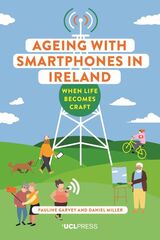
Ageing with Smartphones in Ireland
When Life Becomes Craft
Pauline Garvey
University College London, 2021
On the role smartphones play in the lives of the aging in contemporary Ireland.
This volume documents a radical change in the experience of aging. Based on two ethnographies in Dublin, Ireland, the book illustrates how smartphones enable old people to focus on crafting a new life in retirement. For some, the smartphone is an intimidating burden linked to being on the wrong side of a new digital divide. But for most, however, it has become integral to a new trajectory towards a more sustainable life, both for themselves and their environment. The smartphone has reunited extended family and old friends, helped resolve intergenerational conflicts though new forms of grandparenting, and has become a health resource. This is a book about acknowledging late middle age in contemporary Ireland and examines how older people in Ireland experience life today.
This volume documents a radical change in the experience of aging. Based on two ethnographies in Dublin, Ireland, the book illustrates how smartphones enable old people to focus on crafting a new life in retirement. For some, the smartphone is an intimidating burden linked to being on the wrong side of a new digital divide. But for most, however, it has become integral to a new trajectory towards a more sustainable life, both for themselves and their environment. The smartphone has reunited extended family and old friends, helped resolve intergenerational conflicts though new forms of grandparenting, and has become a health resource. This is a book about acknowledging late middle age in contemporary Ireland and examines how older people in Ireland experience life today.
[more]
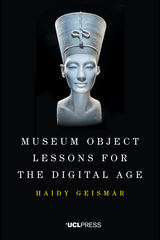
Museum Object Lessons for the Digital Age
Haidy Geismar
University College London, 2018
Among the challenges museums face when displaying digital objects are widely held assumptions about the nature of these objects and the material, social, and political foundations of digital art practices.
Museum Object Lessons for the Digital Age urges readers to question their assumptions through four wide-ranging chapters, each focused on a single object—a box, a pen, an effigy, and a cloak. The book begins with an introduction exploring the legacies of older forms of media and earlier museum practices of collection and then offers a critical analysis of contending theories of knowledge production in museums as it relates to digital projects. From there, Haidy Geismar guides readers in lively, accessible prose through a range of objects, from ethnographic and decorative arts collections, bespoke digital experiments, and even the Google Art Project, revealing what these objects can tell us about both the past and the future of digital collection and display.
Museum Object Lessons for the Digital Age urges readers to question their assumptions through four wide-ranging chapters, each focused on a single object—a box, a pen, an effigy, and a cloak. The book begins with an introduction exploring the legacies of older forms of media and earlier museum practices of collection and then offers a critical analysis of contending theories of knowledge production in museums as it relates to digital projects. From there, Haidy Geismar guides readers in lively, accessible prose through a range of objects, from ethnographic and decorative arts collections, bespoke digital experiments, and even the Google Art Project, revealing what these objects can tell us about both the past and the future of digital collection and display.
[more]
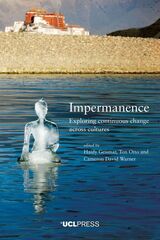
Impermanence
Exploring Continuous Change across Cultures
Haidy Geismar
University College London, 2022
An exploration of the emergent social theory of flux and transformation through dialogue with non-Western traditions of thought.
Nothing lasts forever. This common experience can be the source of much anxiety, but also of hope. The concept of impermanence or continuous change opens up a range of timely questions and discussions that speak to globally shared experiences of transformation and concerns for the future. Impermanence engages with an emergent body of social theory that emphasizes flux and transformation and brings it into a dialogue with other traditions of thought and practice, such as Buddhism, that have sustained a long-lasting and sophisticated meditation on impermanence.
In cases drawn from all over the world, this volume investigates the significance of impermanence in such diverse contexts as social death, atheism, alcoholism, migration, ritual, fashion, oncology, museums, cultural heritage, and art. The authors draw on a wide range of disciplines, including anthropology, archaeology, art history, Buddhist studies, cultural geography, and museology. This volume also includes numerous photographs, artworks, and poems that evocatively communicate notions and experiences of impermanence.
Nothing lasts forever. This common experience can be the source of much anxiety, but also of hope. The concept of impermanence or continuous change opens up a range of timely questions and discussions that speak to globally shared experiences of transformation and concerns for the future. Impermanence engages with an emergent body of social theory that emphasizes flux and transformation and brings it into a dialogue with other traditions of thought and practice, such as Buddhism, that have sustained a long-lasting and sophisticated meditation on impermanence.
In cases drawn from all over the world, this volume investigates the significance of impermanence in such diverse contexts as social death, atheism, alcoholism, migration, ritual, fashion, oncology, museums, cultural heritage, and art. The authors draw on a wide range of disciplines, including anthropology, archaeology, art history, Buddhist studies, cultural geography, and museology. This volume also includes numerous photographs, artworks, and poems that evocatively communicate notions and experiences of impermanence.
[more]
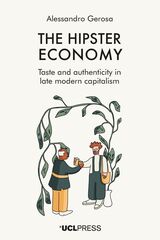
Hipster Economy
Taste and Authenticity in Late Modern Capitalism
Alessandro Gerosa
University College London, 2024
The Hipster Economy analyzes the impact of pursuing authenticity on consumption, urban spaces, and late modern capitalism, to offer a fresh perspective on hipsterism and aesthetic consumption.
The Hipster Economy gives hipsterism the serious analysis it deserves, through which he reveals the importance of hipster aesthetics, based on authenticity, for today’s consumption-based economy.
Since being authentic has become an aspiration and an imperative, the notion of authenticity shapes the consumption habits of individuals in the most diverse contexts such as food and drinks, clothing, music, tourism, and the digital sphere. It even transforms urban areas and their local economies. In this book, Alessandro Gerosa analyzes this complex set of related phenomena to argue that the quest for authenticity has been a driver of Western societies from the emersion of capitalism and industrial society to today.
The Hipster Economy provides a historically and sociologically grounded explanation of the value of authenticity in the contemporary economy and society, through which it shows why and how authenticity has become a fundamental value orienting consumers' taste in late modern capitalism. In clear and convincing writing, Gerosa proposes a novel conceptualization of the aesthetic regime of consumption and an analysis of how the hipster economy impacts the urban space.
The Hipster Economy gives hipsterism the serious analysis it deserves, through which he reveals the importance of hipster aesthetics, based on authenticity, for today’s consumption-based economy.
Since being authentic has become an aspiration and an imperative, the notion of authenticity shapes the consumption habits of individuals in the most diverse contexts such as food and drinks, clothing, music, tourism, and the digital sphere. It even transforms urban areas and their local economies. In this book, Alessandro Gerosa analyzes this complex set of related phenomena to argue that the quest for authenticity has been a driver of Western societies from the emersion of capitalism and industrial society to today.
The Hipster Economy provides a historically and sociologically grounded explanation of the value of authenticity in the contemporary economy and society, through which it shows why and how authenticity has become a fundamental value orienting consumers' taste in late modern capitalism. In clear and convincing writing, Gerosa proposes a novel conceptualization of the aesthetic regime of consumption and an analysis of how the hipster economy impacts the urban space.
[more]
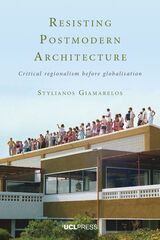
Resisting Postmodern Architecture
Critical Regionalism before Globalisation
Stylianos Giamarelos
University College London, 2022
A critical reappraisal of one of the most popular architectural theories of the recent past on its fortieth anniversary.
Since its first appearance in 1981, critical regionalism has enjoyed a celebrated worldwide reception as an architectural theory that defends the cultural identity of a place resisting the homogenizing onslaught of globalization. Its principles of acknowledging the climate, history, materials, culture, and topography of a specific place are integrated into architects’ education across the globe. But at the same time, the richer cross-cultural history of critical regionalism has frequently been reduced to schematic juxtapositions of “the global” with “the local.”
This book uses more than fifty interviews and previously unpublished archival material from six countries to resituate critical regionalism within the wider framework of debates around postmodern architecture, the diverse contexts from which it emerged, and the cultural media complex that conditioned its reception. In so doing, it explores the intersection of three areas of growing historical and theoretical interest—postmodernism, critical regionalism, and globalization—and shows how the “periphery” was not just a passive recipient, but also an active generator of architectural theory and practice.
Since its first appearance in 1981, critical regionalism has enjoyed a celebrated worldwide reception as an architectural theory that defends the cultural identity of a place resisting the homogenizing onslaught of globalization. Its principles of acknowledging the climate, history, materials, culture, and topography of a specific place are integrated into architects’ education across the globe. But at the same time, the richer cross-cultural history of critical regionalism has frequently been reduced to schematic juxtapositions of “the global” with “the local.”
This book uses more than fifty interviews and previously unpublished archival material from six countries to resituate critical regionalism within the wider framework of debates around postmodern architecture, the diverse contexts from which it emerged, and the cultural media complex that conditioned its reception. In so doing, it explores the intersection of three areas of growing historical and theoretical interest—postmodernism, critical regionalism, and globalization—and shows how the “periphery” was not just a passive recipient, but also an active generator of architectural theory and practice.
[more]
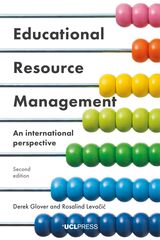
Educational Resource Management
An International Perspective
Derek Glover
University College London, 2020
Resource management, though a central responsibility of school and college leaders, is one that they are often unprepared for. Concise and contextual information and guidance are vital, especially as leaders are pressured from all sides to manage their resources astutely. This new edition of Educational Resource Management: An International Perspective is an updated and globally conscious guide to all aspects of this key responsibility.
Opening with a detailed overview of funding and resource management in public and private institutions, the book looks at the criteria by which the effectiveness, efficiency, and equity of educational resource management can be judged. It goes on to explore cost structures, budgets, and the principles of asset management through case studies that draw on practitioner experiences as well as the authors’ own observations. Educational Resource Management concludes with a review of current tensions and points towards further study, providing a succinct yet comprehensive guide for school and college leaders.
Opening with a detailed overview of funding and resource management in public and private institutions, the book looks at the criteria by which the effectiveness, efficiency, and equity of educational resource management can be judged. It goes on to explore cost structures, budgets, and the principles of asset management through case studies that draw on practitioner experiences as well as the authors’ own observations. Educational Resource Management concludes with a review of current tensions and points towards further study, providing a succinct yet comprehensive guide for school and college leaders.
[more]
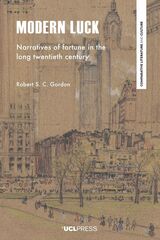
Modern Luck
Narratives of Fortune in the Long Twentieth Century
Robert S. C. Gordon
University College London, 2023
An exploration of luck in modernity, modern imagination, and modern stories.
Beliefs, superstitions, and tales about luck are present across all human cultures. Humans are perennially fascinated by luck and by its association with happiness and danger, uncertainty and aspiration. Yet it remains an elusive, ungraspable idea, one that slips and slides over time: all cultures reimagine what luck is and how to tame it at different stages in their history, and our own era is no exception to the rule.
Modern Luck sets out to explore the enigma of luck’s presence in modernity, examining the hybrid forms it has taken on in the modern imagination, and in particular in the field of modern stories. Analyzing a rich and unusually eclectic range of narratives taken from literature, film, music, television, and theatre, from Dostoevsky to Philip K. Dick, Pinocchio to Cimino, Curtiz to Kieslowski, it lays out first the usages and meanings of the language of luck, and then the key figures, patterns, and motifs that govern the stories told about it, from the late nineteenth century to the present day.
Beliefs, superstitions, and tales about luck are present across all human cultures. Humans are perennially fascinated by luck and by its association with happiness and danger, uncertainty and aspiration. Yet it remains an elusive, ungraspable idea, one that slips and slides over time: all cultures reimagine what luck is and how to tame it at different stages in their history, and our own era is no exception to the rule.
Modern Luck sets out to explore the enigma of luck’s presence in modernity, examining the hybrid forms it has taken on in the modern imagination, and in particular in the field of modern stories. Analyzing a rich and unusually eclectic range of narratives taken from literature, film, music, television, and theatre, from Dostoevsky to Philip K. Dick, Pinocchio to Cimino, Curtiz to Kieslowski, it lays out first the usages and meanings of the language of luck, and then the key figures, patterns, and motifs that govern the stories told about it, from the late nineteenth century to the present day.
[more]
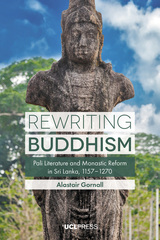
Rewriting Buddhism
Pali Literature and Monastic Reform in Sri Lanka, 1157–1270
Alastair Gornall
University College London, 2020
Rewriting Buddhism is the first intellectual history of premodern Sri Lanka’s most culturally productive period. This era of reform shaped the nature of Theravada Buddhism both in Sri Lanka and Southeast Asia, and even today continues to define monastic intellectual life in the region. Alastair Gornall argues that the long century’s literary productivity was not born of political stability, as is often thought, but rather of the social, economic and political chaos brought about by invasions and civil wars.
[more]
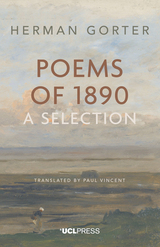
Herman Gorter
Poems of 1890: A Selection
Herman Gorter
University College London, 2015
Commonly viewed as a revolutionary and propagandist Herman Gorter (1864–1927) is often overlooked despite his lasting contribution to Dutch poetry. This selection of thirty-one poems, translated by Paul Vincent, focuses on Gorter’s experimental love and nature lyrics in Poems of 1890, and the Introduction sets the poems in the context of his earlier seminal work 'Mei' (May) as well as his often neglected Socialist verse. The lyrical expansiveness, consistent use of rhyme and vivid imagery of the Dutch landscape that characterises 'Mei' evolves into more fragmentary verse in Poems of 1890, and the joyful celebratory tone of Gorter’s poetry increasingly co-exists with a sense of isolation and introspection. This can be viewed in the context of a rapidly changing political scene in Europe in the prelude to the First World War and the Russian Revolution. This is a valuable collection that revisits Gorter’s literary and political legacy, and introduces English-speaking readers to a selection of his most accessible and lyrical poems
[more]
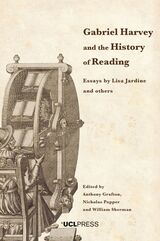
Gabriel Harvey and the History of Reading
Essays by Lisa Jardine and others
Anthony Grafton
University College London, 2024
An accessible exploration of the methodology of the history of reading.
Few articles in the humanities have had the impact of Lisa Jardine and Anthony Grafton’s seminal “Studied for Action,” a study of the reading practices of Elizabethan polymath and prolific annotator Gabriel Harvey. Their excavation of the setting, methods, and ambitions of Harvey’s encounters with his books ignited a new interdisciplinary field, the history of reading, which quickly became one of the most exciting corners of the scholarly cosmos. A generation inspired by the model of Harvey fanned out across the world’s libraries and archives, seeking to reveal the many creative, unexpected, and curious ways that individuals throughout history responded to texts, and how these interpretations, in turn, illuminate past worlds.
Three decades on, Harvey’s example and Jardine’s work remain central to cutting-edge scholarship in the history of reading. By uniting “Studied for Action” with new studies on Gabriel Harvey, some of which are published here for the first time, by Jardine, Grafton, and the scholars they have influenced, this collection provides a unique lens on the place of marginalia in textual, intellectual, and cultural history. The chapters capture subsequent work on Harvey and map the fields opened by Jardine and Grafton’s original article, collectively offering a posthumous tribute to Lisa Jardine and an authoritative overview of the History of Reading.
Few articles in the humanities have had the impact of Lisa Jardine and Anthony Grafton’s seminal “Studied for Action,” a study of the reading practices of Elizabethan polymath and prolific annotator Gabriel Harvey. Their excavation of the setting, methods, and ambitions of Harvey’s encounters with his books ignited a new interdisciplinary field, the history of reading, which quickly became one of the most exciting corners of the scholarly cosmos. A generation inspired by the model of Harvey fanned out across the world’s libraries and archives, seeking to reveal the many creative, unexpected, and curious ways that individuals throughout history responded to texts, and how these interpretations, in turn, illuminate past worlds.
Three decades on, Harvey’s example and Jardine’s work remain central to cutting-edge scholarship in the history of reading. By uniting “Studied for Action” with new studies on Gabriel Harvey, some of which are published here for the first time, by Jardine, Grafton, and the scholars they have influenced, this collection provides a unique lens on the place of marginalia in textual, intellectual, and cultural history. The chapters capture subsequent work on Harvey and map the fields opened by Jardine and Grafton’s original article, collectively offering a posthumous tribute to Lisa Jardine and an authoritative overview of the History of Reading.
[more]
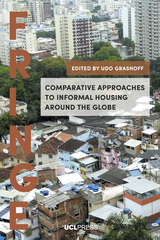
Comparative Approaches to Informal Housing Around the Globe
Udo Grashoff
University College London, 2020
How do squatting settlements in Kyrgyzstan and Kazakhstan differ from right-wing squatting in Germany? What commonalities does squatting activism in Brazil and Spain share with squatting in post-World War II UK and Australia? In Comparative Approaches to Informal Housing Around the Globe historians, anthropologists, political scientists, sociologists, urban planners, and political activists come together to break new ground in exploring the globalization of knowledge about informal housing. Coming from a diverse collection of perspectives and places, they compare informal settlements, unauthorized occupation of flats, illegal housing construction, and political squatting all around the world.
The contributors to Comparative Approaches to Informal Housing Around the Globe engage with a sweeping variety of topics and contribute specialist knowledge from Africa, Asia, Australia, the Middle East, North and South America, and Eastern and Western Europe. Bringing together such a wide range of authors and subjects demonstrates the power of comparative research to open new perspectives.
The contributors to Comparative Approaches to Informal Housing Around the Globe engage with a sweeping variety of topics and contribute specialist knowledge from Africa, Asia, Australia, the Middle East, North and South America, and Eastern and Western Europe. Bringing together such a wide range of authors and subjects demonstrates the power of comparative research to open new perspectives.
[more]
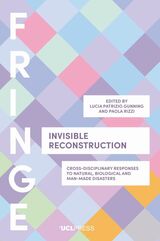
Invisible Reconstruction
Cross-Disciplinary Responses to Natural, Biological and Man-Made Disasters
Lucia Patrizio Gunning
University College London, 2022
Repairing communities, not just buildings, in the wake of disasters.
What does it really mean to reconstruct a city after a disaster? Is the repair and reinstatement of buildings and infrastructure sufficient? This volume argues that the true measure of success should be societal. After all, a city without people is no city at all. The book brings together academics and practitioners from a wide variety of disciplines, comparing strategies and outcomes in different scenarios and cultures from South America, Europe, and Asia. From cultural heritage and public space to education and participation, contributors reflect on the interconnection of people, culture, and environment and constructive approaches to increasing resilience and reducing vulnerability. Bringing practical examples of how communities and individuals have reacted to or prepared for disaster, the publication proposes a shift in public policy to ensure that physical reinforcement and rebuilding are matched by attention to societal needs. Invisible Reconstruction is essential reading for policymakers, academics, and practitioners working to reduce the impact of disasters or to improve post-disaster recovery.
What does it really mean to reconstruct a city after a disaster? Is the repair and reinstatement of buildings and infrastructure sufficient? This volume argues that the true measure of success should be societal. After all, a city without people is no city at all. The book brings together academics and practitioners from a wide variety of disciplines, comparing strategies and outcomes in different scenarios and cultures from South America, Europe, and Asia. From cultural heritage and public space to education and participation, contributors reflect on the interconnection of people, culture, and environment and constructive approaches to increasing resilience and reducing vulnerability. Bringing practical examples of how communities and individuals have reacted to or prepared for disaster, the publication proposes a shift in public policy to ensure that physical reinforcement and rebuilding are matched by attention to societal needs. Invisible Reconstruction is essential reading for policymakers, academics, and practitioners working to reduce the impact of disasters or to improve post-disaster recovery.
[more]
READERS
Browse our collection.
PUBLISHERS
See BiblioVault's publisher services.
STUDENT SERVICES
Files for college accessibility offices.
UChicago Accessibility Resources
home | accessibility | search | about | contact us
BiblioVault ® 2001 - 2024
The University of Chicago Press









